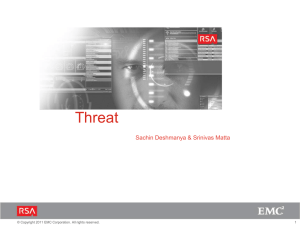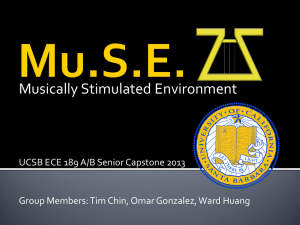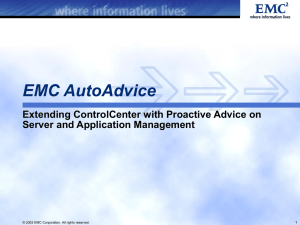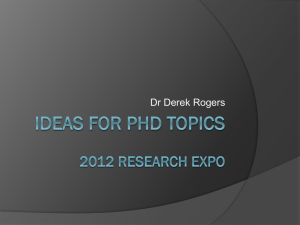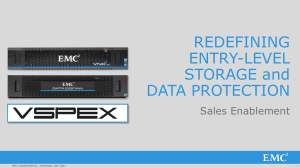EMC Education in the world and in Israel
advertisement
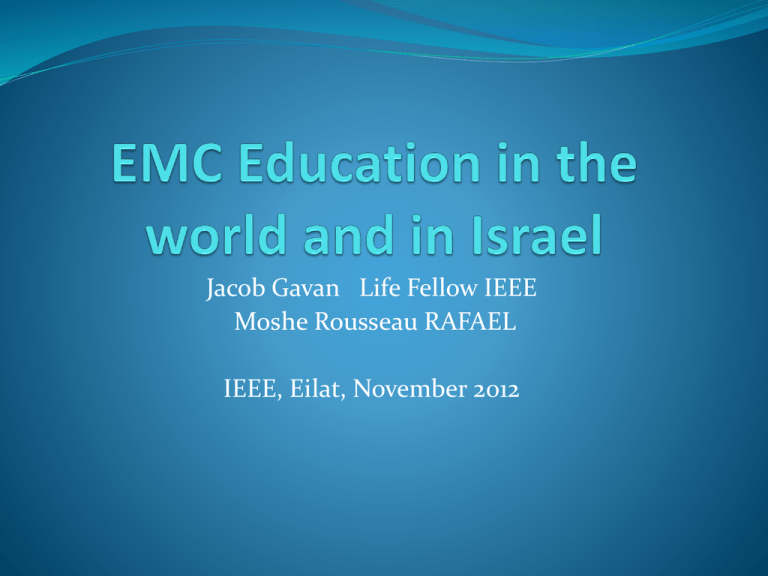
Jacob Gavan Life Fellow IEEE Moshe Rousseau RAFAEL IEEE, Eilat, November 2012 Headlines Definition of EMC EMC interdisciplinary Technology Importance EMC (Fundamental) Basic EMC Applied EMC Education in the World EMC Education in Israel Conclusions Definition of EMC Electro Magnetic Compatibility (EMC). IEEE EMC Society Definition: Origin, Control and Measurements of EMC Effects on Electric, Electronic and Biological Components, Subsystems and Systems. Several Experts Opinion is that EMC is More an Art than a Technology. EMC Importance EMC has become increasingly important because of its wide ranging industrial and more general social (for instance medical) implementation. Meeting EMC standards is a basic requirement for any electric and electronic device, circuit or system before placement on the market and use. EMC problems are thus one of the main concerns of the telecommunication, electronics, automobile ,space industry, etc. EMC interdisciplinary Technology Importance without Efficient and Drastic EMC Regulations Policies Radio Services and Systems will Mutually Disturb Each Other and Chaos May Prevail. Comparison Between EMC and Space (Satellites) Technologies: EMC technology is Connected only to Electric or Magnetic Effects. Space technology is connected also to Mechanic, Chemistry and Aeronautical effects. However Electrical, Electronic and Radio Com. Systems are of the most importance. Main Advantages from EMC Specialists Designing Products Short time to Market Cheaper Costs Superior Product Quality More Benefits Urgent requirement of EMC specialists in Quantity and with Quality EMC (Fundamental) Basic Electromagnetic fields ,Transmission lines Conduction, Radiation, Shielding, Grounding, PCB, Testing, Measurements, Simulations. Shielded, Reverberation and Anechoic Chambers. Filtering. Nowadays Signal Integrity (SI) become an important part of EMC EMC APPLIED Telecommunication and Radio com.: Spectrum utilization, noise sources, interference(EMI), etc. Power Engineering: HEMP, ESD, Lightning, Corona, etc. Biology: Non –Ionized radiation hazards, Radio and ELF thermal effects ,etc. EMC Education in North America The first EMC specialists were formed in the US army beginning around 80 years ago . Now good undergraduate and graduate programs in EMC are in the following U.: Missouri-Rolla, Michigan, Kentucky, Syracuse, Florida, Concordia Oklahoma- state U., etc. Strong support from the: IEEE EMC society grants ,DL and advisers, NIST, FCC ,NASA ,DARPA. The INARTE EMC accreditation organization and the EMC U. centers are in the US. Several short courses and Lab. Training are organized by world leaders in the EMC field. EMC Education in Europe A lot of EMC activities and education programs in most European countries. In the lead is the UK with York. and Hull U. common under and graduate EMC programs, Surrey, etc. Switzerland with Zurich and Lausanne high technical U. Italy LAquila U. has received an IEEE grant for an outstanding EMC program. Provided also high level EMC academic programs in France ,Russia ,Nederland ,etc. Yearly EMC conferences especially in Zurich and Wroclaw. ITU,URSI,CENELEC,CISPR,ETSI,EN involved in EMC standards are operating from Europe. EMC Education in Asia China: U. of Post and Telecommunication in Beijing around 15k students (Prof. Gao Yougon) and in Nanjing around 10k students have strong EMC departments. In Tshingua U. and in several other engineering U. also several EMC courses and labs. Japan: is also very advanced in EMC technology and have several technical U. with a good program in EMC. Singapore: Strong ties with Israel and the Nanyang Tech. U. is leading in the field of EMC. All Asian Tiger Countries: Korea, Taiwan, Malaysia, etc Australia ,New Zealand and India. EMC Education in Israel Lack of University EMC courses. Except than an EMC oriented course of 3h weekly in the EEC Engineering faculty in HIT only between 2005 to 2008. The EMC specialists operating in Israel are trained abroad, or are EECC engineers or graduated in physics receiving short EMC courses abroad, in Israel or on the job. RAFAEL was pioneer in the field of EMC in Israel. EMC course Syllabus in HIT The EMC Standards and Regulations The EMC Lab. Signal Spectra Radiation Emissions and Susceptibility Conducted Emissions and Susceptibility Crosstalk Shielding The system link budget Equations Inter-System EMI Prediction and Control Formation of EMC Specialists Undergraduate EMC Engineering EECC Engineering Physics BSc Short Courses in EMC or in job Training Qualified EMC Engineers INARTE Certification Short Courses in EMC or in job Training INARTE Certification Qualified EMC Technicians MSc in EMC Phd in EMC EECC Technicians EMC Scientists R&D Requirements for the formation of Academic EMC Specialists Academic EMC Specialist Teachers. Accredited courses in the U. Syllabus. Attract Students to the Complex EMC subject. Well Equipped Laboratories. Support from the Industry and the Authorities. Support from the IEEE EMC society using the U. grant program. Conclusions EMC Expertise is Extremely Important for all industry and Systems Including Electric, Magnetic or Electronic Elements and Effects. Therefore Undergraduate and Graduate U. Formation of EMC Specialists is Very Beneficial for Students and the Industry. In the World Several U. Have Good Programs in EMC In Israel not any U. or Institute Have to Date a Special Program in EMC, However we Have Some Outstanding Experts in EMC but not Enough. Therefore the Establishment of a Theoretic and Practical EMC Programs in some Israelis U. will be Beneficial. Selected Books in EMC C. R. Paul, “ Introduction to Electromagnetic Compatibility”, J. Wiley, 2006. R. Perez, Editor; “Handbook of Electromagnetic Compatibility”, Academic Press, 1995. M. Ianoz, Editor; “Electromagnetic Compatibility in Electrical and Electronic Apparatus and Systems”EEC-Cost243 final Report, 2000. M. Montrose, E.Nakauchi; “Testing for EMC Compliances: Approaches and Techniques”, J.Wiley, 2004. O.Hartal, “Electromagnetic Compatibility by Design”, R&B Enterprises, 1992. M. Mardiguain, “Controlling Radiated Emission by Design” Kluwer Academic Pub., 2001. D. White, “Electromagnetic Interference and Compatibility” (Vol. 3) Selected Reviews in EMC IEEE Transactions on EMC URSI Radio Science Bulletin (RSB) ITU Journal Electronics Letters EMC Conference & Symposium Proceeding Selected Articles in EMC Education T. Hubing, A.Orlandi; “ A Brief History of EMC Education”, IEEE Trans. On EMC, pp(94-98),May 1995 N.G. Riley, M. Darnell, A.C. Marvin, J. Tealby; “A University Post Graduate Course in EMC” J. Shapira; “EMC from Garbage of Electronics to Global Intersystem Compatibility”, May 2008 ,COMCAS. PROGRAM ENGINEERING MANAGER & DEPUTY CORPORATE ENGINEERING SYSTEM TECHNOLOGY ELECTRONIC (SUBSYSREMS) PROJECT ENGINEER SYSTEM PROJECT ENGINEER SYSTEMS INTEGRATION SR GRP LDR EMC GROUP LEADER (SUBSYSTEN ONLY) SYSTEM DESIGN ELECTROMAGNETIC COMPATIBILITY (EMC) GROUP HEAD SUBSYSTEMS SYSTEMS ANALYSIS SYSTEMS TEST


